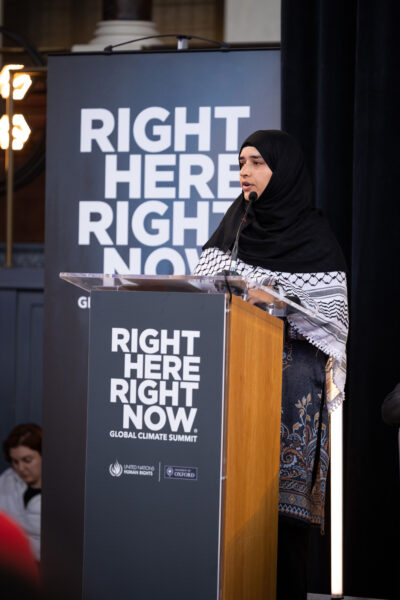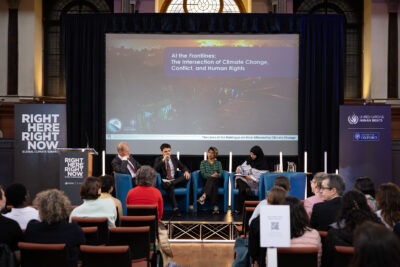We are proud to share the speech that Somerville MSc student Tabina Manzoor delivered at the Right Here, Right Now conference earlier this month. The conference, co-hosted by United Nations Human Rights and the University of Oxford, aimed to advance the conversation around climate change and human rights. This global summit was held in partnership with the Right Here, Right Now Global Climate Alliance, the International Universities Climate Alliance and co-host universities across the world, was the largest climate justice gathering of its kind so far.

Tabina delivering her speech
My name is Tabina Manzoor, and I am currently pursuing the MSc in Water Science, Policy and Management at the School of Geography and the Environment, University of Oxford. I’m supported by the Amansa Scholarship at the Oxford India Centre for Sustainable Development at Somerville College.
I come from Kashmir, a place often defined by its volatility and geopolitics, caught between three nuclear-armed nations and frequently in the headlines for its conflict. But as someone working on water resource management in Kashmir, I am struck-and frankly, appalled by how rarely we speak about its vulnerability to climate change. A humanitarian crisis is unfolding quietly, overshadowed by the noise of political strife.
Climate change is not an abstract future threat; it is a lived reality. It knows no borders, respects no treaties, and recognizes no economies. It demands a radical rethinking of how we talk about justice, survival, and peace.
While we often discuss the divide between the Global North and South, we must confront the truth that some communities are not just vulnerable – they are on the frontlines. To speak of climate without speaking of conflict, of human rights, of survival – is to speak in half-truths.
From Ukraine to Palestine, Syria to Sudan, we see populations devastated by human made crises, while the slow violence of climate change compounds their suffering. And back home in Kashmir, people are barely surviving under the weight of political uncertainty. How can we expect them to speak of climate action when the right to simply live is under threat?
Add to that the Himalayan region, which is among the most climate-vulnerable ecosystems on the planet. Melting glaciers, erratic precipitation, and extreme weather events not only threaten millions of lives downstream, but also risk igniting new conflicts over water, land, and survival. This is no longer a distant concern – it is here, and it is now.

Panellists Andrew Gilmour, Michael Phoenix, Dr. Shruthi Nath, and Tabina Manzoor
Today’s session titled, “At the Frontlines: The Intersection of Climate Change, Conflict and Human Rights,” will explore precisely these urgent intersections. We are joined by three remarkable speakers who bring depth and insight to this conversation.
As someone who is inheriting this chaos, I am here before you not just as a student, but as a representative of a generation whose future is more uncertain than any that came before. We cannot afford to look away. This summit and this session is one step forward – but our commitment cannot end with conversation. We need courage, conviction, and both intergenerational and transnational collective action to build a future that offers opportunity to the vulnerable, equity to the marginalized, and dignity to those trapped in crises they did not create.
Tabina Manzoor Biography
Tabina Manzoor is a student, researcher, and environmentalist currently pursuing an MSc in Water Science, Policy, and Management at the School of Geography and the Environment, as an Amansa Scholar with the Oxford India Centre for Sustainable Development (OICSD). She comes from Kashmir, and growing up in the countryside of the Himalayas, developed a deep love for nature and water, which has guided her academic interests in environmental science and water governance. She holds an MSc in Environmental Science from the University of Kashmir, Srinagar, and a Bachelor’s degree in Life Sciences from Women’s Degree College, Anantnag, University of Kashmir. She also holds a Postgraduate Diploma in Environmental Law and Policy, offered online by WWF-India in collaboration with the National Law University, Delhi. Her MSc (Environmental Science) dissertation focused on the “Inventory and Water Quality Assessment of Freshwater Springs in Tehsil Anantnag of the Kashmir Himalaya,” supported by SERB-DST, Government of India. She has worked as a JKSTIC-DST fellow with the Government of Jammu and Kashmir, and as a project fellow on “Microplastics in Drinking Water of Srinagar City: An Alarming Threat to Human Health,” funded by the J&K Science, Technology & Innovation Council. Motivated by a desire to highlight the resilience of rural women in her region, she conceptualized and currently leads a qualitative research project titled “Resilient Women of Kashmir: Navigating Domestic Duties and Economic Participation through Vegetable and Milk Sales.” This work explores how women in remote Himalayan communities manage domestic responsibilities while contributing meaningfully to household incomes, often in the absence of formal support systems. Beyond research, she has volunteered with the Borderless World Foundation and serves as a mentor with Project Eduaccess, supporting students from underrepresented and marginalised communities in South Asia to access higher education.